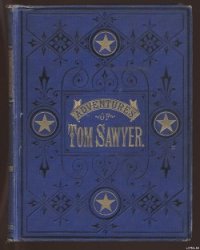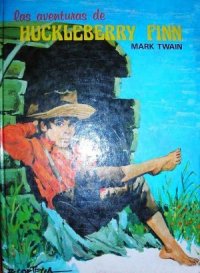The Adventures of Huckleberry Finn - Twain Mark (читать книги онлайн регистрации TXT) 📗
I got to feeling so mean and so miserable I most wished I was dead. I fidgeted up and down the raft, abusing myself to myself, and Jim was fidgeting up and down past me. We neither of us could keep still. Every time he danced around and says, «Dah's Cairo!» it went through me like a shot, and I thought if it WAS Cairo I reckoned I would die of miserableness.
Jim talked out loud all the time while I was talking to myself. He was saying how the first thing he would do when he got to a free State he would go to saving up money and never spend a single cent, and when he got enough he would buy his wife, which was owned on a farm close to where Miss Watson lived; and then they would both work to buy the two children, and if their master wouldn't sell them, they'd get an Ab'litionist to go and steal them.
It most froze me to hear such talk. He wouldn't ever dared to talk such talk in his life before. Just see what a difference it made in him the minute he judged he was about free. It was according to the old saying, «Give a nigger an inch and he'll take an ell.» Thinks I, this is what comes of my not thinking. Here was this nigger, which I had as good as helped to run away, coming right out flat-footed and saying he would steal his children-children that belonged to a man I didn't even know; a man that hadn't ever done me no harm.
I was sorry to hear Jim say that, it was such a lowering of him. My conscience got to stirring me up hotter than ever, until at last I says to it, «Let up on me-it ain't too late yet-I'll paddle ashore at the first light and tell.» I felt easy and happy and light as a feather right off. All my troubles was gone. I went to looking out sharp for a light, and sort of singing to myself. By and by one showed. Jim sings out:
«We's safe, Huck, we's safe! Jump up and crack yo' heels! Dat's de good ole Cairo at las', I jis knows it!»
I says:
«I'll take the canoe and go and see, Jim. It mightn't be, you know.»
He jumped and got the canoe ready, and put his old coat in the bottom for me to set on, and give me the paddle; and as I shoved off, he says:
«Pooty soon I'll be a-shout'n' for joy, en I'll say, it's all on accounts o' Huck; I's a free man, en I couldn't ever ben free ef it hadn' ben for Huck; Huck done it. Jim won't ever forgit you, Huck; you's de bes' fren' Jim's ever had; en you's de ONLY fren' ole Jim's got now.»
I was paddling off, all in a sweat to tell on him; but when he says this, it seemed to kind of take the tuck all out of me. I went along slow then, and I warn't right down certain whether I was glad I started or whether I warn't. When I was fifty yards off, Jim says:
«Dah you goes, de ole true Huck; de on'y white genlman dat ever kep' his promise to ole Jim.»
Well, I just felt sick. But I says, I GOT to do it-I can't get OUT of it. Right then along comes a skiff with two men in it with guns, and they stopped and I stopped. One of them says:
«What's that yonder?»
«A piece of a raft,» I says.
«Do you belong on it?»
«Yes, sir.»
«Any men on it?»
«Only one, sir.»
«Well, there's five niggers run off to-night up yonder, above the head of the bend. Is your man white or black?»
I didn't answer up prompt. I tried to, but the words wouldn't come. I tried for a second or two to brace up and out with it, but I warn't man enough-hadn't the spunk of a rabbit. I see I was weakening; so I just give up trying, and up and says:
«He's white.»
«I reckon we'll go and see for ourselves.»
«I wish you would,» says I, «because it's pap that's there, and maybe you'd help me tow the raft ashore where the light is. He's sick-and so is mam and Mary Ann.»
«Oh, the devil! we're in a hurry, boy. But I s'pose we've got to. Come, buckle to your paddle, and let's get along.»
I buckled to my paddle and they laid to their oars. When we had made a stroke or two, I says:
«Pap'll be mighty much obleeged to you, I can tell you. Everybody goes away when I want them to help me tow the raft ashore, and I can't do it by myself.»
«Well, that's infernal mean. Odd, too. Say, boy, what's the matter with your father?»
«It's the-a-the-well, it ain't anything much.»
They stopped pulling. It warn't but a mighty little ways to the raft now. One says:
«Boy, that's a lie. What IS the matter with your pap? Answer up square now, and it'll be the better for you.»
«I will, sir, I will, honest-but don't leave us, please. It's the-the
—Gentlemen, if you'll only pull ahead, and let me heave you the headline, you won't have to come a-near the raft-please do.»
«Set her back, John, set her back!» says one. They backed water. «Keep away, boy-keep to looard. Confound it, I just expect the wind has blowed it to us. Your pap's got the small-pox, and you know it precious well. Why didn't you come out and say so? Do you want to spread it all over?»
«Well,» says I, a-blubbering, «I've told everybody before, and they just went away and left us.»
«Poor devil, there's something in that. We are right down sorry for you, but we-well, hang it, we don't want the small-pox, you see. Look here, I'll tell you what to do. Don't you try to land by yourself, or you'll smash everything to pieces. You float along down about twenty miles, and you'll come to a town on the left-hand side of the river. It will be long after sun-up then, and when you ask for help you tell them your folks are all down with chills and fever. Don't be a fool again, and let people guess what is the matter. Now we're trying to do you a kindness; so you just put twenty miles between us, that's a good boy. It wouldn't do any good to land yonder where the light is-it's only a wood-yard. Say, I reckon your father's poor, and I'm bound to say he's in pretty hard luck. Here, I'll put a twenty-dollar gold piece on this board, and you get it when it floats by. I feel mighty mean to leave you; but my kingdom! it won't do to fool with small-pox, don't you see?»
«Hold on, Parker,» says the other man, «here's a twenty to put on the board for me. Good-bye, boy; you do as Mr. Parker told you, and you'll be all right.»
«That's so, my boy-good-bye, good-bye. If you see any runaway niggers you get help and nab them, and you can make some money by it.»
«Good-bye, sir,» says I; «I won't let no runaway niggers get by me if I can help it.»
They went off and I got aboard the raft, feeling bad and low, because I knowed very well I had done wrong, and I see it warn't no use for me to try to learn to do right; a body that don't get STARTED right when he's little ain't got no show-when the pinch comes there ain't nothing to back him up and keep him to his work, and so he gets beat. Then I thought a minute, and says to myself, hold on; s'pose you'd a done right and give Jim up, would you felt better than what you do now? No, says I, I'd feel bad-I'd feel just the same way I do now. Well, then, says I, what's the use you learning to do right when it's troublesome to do right and ain't no trouble to do wrong, and the wages is just the same? I was stuck. I couldn't answer that. So I reckoned I wouldn't bother no more about it, but after this always do whichever come handiest at the time.
I went into the wigwam; Jim warn't there. I looked all around; he warn't anywhere. I says:
«Jim!»
«Here I is, Huck. Is dey out o' sight yit? Don't talk loud.»
He was in the river under the stern oar, with just his nose out. I told him they were out of sight, so he come aboard. He says:
«I was a-listenin' to all de talk, en I slips into de river en was gwyne to shove for sho' if dey come aboard. Den I was gwyne to swim to de raf' agin when dey was gone. But lawsy, how you did fool 'em, Huck! Dat WUZ de smartes' dodge! I tell you, chile, I'spec it save' ole Jim-ole Jim ain't going to forgit you for dat, honey.»
Then we talked about the money. It was a pretty good raise-twenty dollars apiece. Jim said we could take deck passage on a steamboat now, and the money would last us as far as we wanted to go in the free States. He said twenty mile more warn't far for the raft to go, but he wished we was already there.



